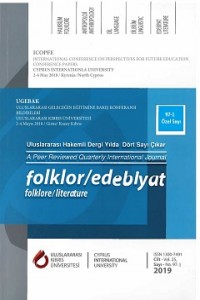Öz
This present study adapts feminist stylistics framework to examine and analyse the gender
representations and language of the laugh of the Medusa a speech written by Héléne Cixous. The paper,
using a content analysis method, will mainly focus on issues related to gender representations and the
language to interpret and uncover the implied and underlying meanings of the text. Héléne Cixous in
her speech brings samples from the ancient Greek mythology of Medusa to give advices to her young
female audience to write for themselves. She highlights the challenges and struggles that females have
been repressed themselves through the patriarchal society. She encourages young girls to express
themselves, their strengths and strong points in bravely through writing and boys to understand the
feminine world. The study will scrutinize the speech to reveal the foregrounded features related to
gender.
Anahtar Kelimeler
Female Representations Feminism Stylistics Héléne Cixous Medusa
Kaynakça
- Cixous, H. 1975. “The Laugh of the Medusa.” Petroleuse Press, University of Paris VIIIVincennes.
- Fraenkel, J, Norman E.W., and Hyun, H. H. (2012). How to Design and Evaluate Research in Education. New York: McGraw-Hill. 111.
- Freud, S. 1920. “A General Information to Psychoanalysis.” PDF Books World. Workdcat (source edition) 41681643.
- Foucault, M. 1978. “The History of Sexuality.” Volume 1: An Introduction Panthean Books, NewYork
- Lee, W. L. (2007). Aristotle’s Ecological Conception of Living Things and its Significance for Feminist Theory. Diametros nr 14 (grudzien): 68-84.
- Mills, S. (2005). “Feminist Stylistics.” The Interface series, Routledge London and New York.
- Storr, M. (1999). “Bisexuality: A Critical Reader.” Routledge, London and New York.
- Wettler, B. T. (1995). “Secular Feminist Religious Metaphor and Christianity.” Jets 38/1 77-92.
- Williams, S. H. (1995). “Feminist Theory of Freedom of Speech.” Feminist legal Epistemology, 8 Berkeley Woman’s…In Everyday Life. 17, 18 (Dana E. Bushnell ed)
Öz
Bu çalışmada, Feminist Biçembilimsel kuramı ışığında uygulanmaktadır Héléne Cixois’in The Laugh of
The Medusa adlı eserinin dili incelenmiştir. Içerik analiz yöntemi kullanılarak incelenen makalede,
temel olarak cinsiyet betimlemeleri ve metinin ima edilen ve altında yatan anlamları yorumlamak ve
ortaya çıkartmak amaçlanmıştır. Héléne Cixous kullandığı dilde Medusa adlı eski Yunan mitolojisinden
örnekler alıp, genç kadın dinleyicilerine önerilerde bulunmaktadır. Kadınların ataerkil toplumunun
baskısı altında olduklarını ve bunlara nasıl meydan okuduklaını, ve bunun için nasıl savaştıklarını
anlatmaktadır. Yazar eserinde genç kızları, kendilerini ifade etmeleri için cesaretlendiriyor. Ona göre
genç kızlar, güçlü duygularını cesaretle kaleme dökmeli. Bununla beraber genç erkekler de kadının dünyasını anlamalıdırlar. Çalışma kısaca, dilin cinsiyetle ilgili özellikleri nasıl ortaya çıkardığıyla
ilgilenmektedir.
Anahtar Kelimeler
Kaynakça
- Cixous, H. 1975. “The Laugh of the Medusa.” Petroleuse Press, University of Paris VIIIVincennes.
- Fraenkel, J, Norman E.W., and Hyun, H. H. (2012). How to Design and Evaluate Research in Education. New York: McGraw-Hill. 111.
- Freud, S. 1920. “A General Information to Psychoanalysis.” PDF Books World. Workdcat (source edition) 41681643.
- Foucault, M. 1978. “The History of Sexuality.” Volume 1: An Introduction Panthean Books, NewYork
- Lee, W. L. (2007). Aristotle’s Ecological Conception of Living Things and its Significance for Feminist Theory. Diametros nr 14 (grudzien): 68-84.
- Mills, S. (2005). “Feminist Stylistics.” The Interface series, Routledge London and New York.
- Storr, M. (1999). “Bisexuality: A Critical Reader.” Routledge, London and New York.
- Wettler, B. T. (1995). “Secular Feminist Religious Metaphor and Christianity.” Jets 38/1 77-92.
- Williams, S. H. (1995). “Feminist Theory of Freedom of Speech.” Feminist legal Epistemology, 8 Berkeley Woman’s…In Everyday Life. 17, 18 (Dana E. Bushnell ed)
Ayrıntılar
| Birincil Dil | İngilizce |
|---|---|
| Konular | Türk Halk Bilimi |
| Bölüm | Derleme Makaleleri -Compilation Articles |
| Yazarlar | |
| Yayımlanma Tarihi | 20 Eylül 2019 |
| Yayımlandığı Sayı | Yıl 2019 Cilt: 25 Sayı: 97 |
Derginin yayım dili Türkçe ve İngilizce’dir, ayrıca Türkçe de olsa tüm basılan makalelerin başlık, öz ve anahtar sözcükleri İngilizce olarak da makalede bulunur. Hakemlerden onay almış Türkçe makaleler için 750-1000 sözcükten oluşan genişletilmiş özet (extended summary) gereklidir. Elektronik çeviriler kabul edilmez.
Dergi TR-Dizin, Web of Science (ESCI), DOAJ ile diğer pek çok dizin tarafından taranmaktadır. Scimagoe quartile değeri: Q2 'dir:
TR DIZIN 2020 Etik Kriterleri kapsamında, dergimize 2020 yılından itibaren etik kurul izni gerektiren çalışmalar için makalenin yöntem bölümünde ilgili Etik Kurul Onayı ile ilgili bilgilere (kurul-tarih-sayı) yer verilmesi gerekecektir. Bu nedenle dergimize makale gönderecek olan yazarlarımızın ilgili kriteri göz önünde bulundurarak makalelerini düzenlemeleri önemle rica olunur.
Alan Editörleri/ Field Editörs
Halkbilimi/Folklore
Prof.Dr. Hande Birkalan-Gedik (JohannWolfgang-Goethe İniversitet-birkalan-gedik@m.uni-frankfurt.de)
Prof.Dr. Ali Yakıcı (Gazi Üniversitesi-yakici@gazi.edu.tr)
Prof.Dr. Aynur Koçak (Yıldız Teknik Üniversitesi-nurkocak@yildiz.edu.tr)
Prof.Dr. Işıl Altun ( (Regensburg Üniversitesi/Kocaeli Üniversitesi-İsil.Altun@zsk.uni-regensburg.de)
Edebiyat/Literature
Prof.Dr. Abdullah Uçman (Mimar Sinan Güzel Sanatlar Üniversitesi -emekli-29 MayısÜniversitesi-abdullahucman@29mayis.edu.tr
Prof. Dr. Ramazan Korkmaz (Ardahan Üniversitesi-emekli-Kafkasya Üniversiteler Birliği -KÜNİB-r_korkmaz@hotmail.com)
Prof.Dr. Emel Kefeli (Marmara Üniversitesi-emekli-İstanbul 29 Mayıs Üniversitesi-ayseemelkefeli @gmail.com)
Prof.Dr. Zekiye Antakyalıoğlu ( İstanbul Aydın Üniversitesi-zekabe@hotmail.com)
Antropoloji/Anthropology
Prof.Dr. Hanife Aliefendioğlu (Doğu Akdeniz Üniversitesi-hanife.aliefendioglu@emu.edu.tr)
Prof. Dr. Şebnem Pala Güzel (Başkent Üniversitesi-sebnempa@baskent.edu.tr)
Prof.Dr. Derya Atamtürk Duyar (İstanbul Üniversitesi-datamturk@istanbul.edu.tr)
Prof.Dr. Meryem Bulut (Ankara Üniversitesi-meryem.bulut@gmail.com)
Dil-Dilbilim/Language-Linguistics
Prof.Dr. Nurettin Demir (Hacettepe Üniversitesi-demir@hacettepe.edu.tr)
Prof. Dr. Aysu Erden (Maltepe Üniversitesi-aysuerden777@gmail.com)
Prof.Dr. Sema Aslan Demir (Hacettepe Üniversitesi-semaaslan@hacettepe.edu.tr)


